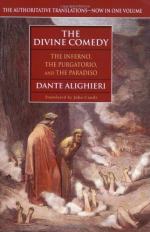Her eyes fast fix’d on the eternal wheels,
Beatrice stood unmov’d; and I with ken
Fix’d upon her, from upward gaze remov’d
At her aspect, such inwardly became
As Glaucus, when he tasted of the herb,
That made him peer among the ocean gods;
Words may not tell of that transhuman change:
And therefore let the example serve, though weak,
For those whom grace hath better proof in store
If I were only what thou didst create,
Then newly, Love! by whom the heav’n is rul’d,
Thou know’st, who by thy light didst bear me
up.
Whenas the wheel which thou dost ever guide,
Desired Spirit! with its harmony
Temper’d of thee and measur’d, charm’d
mine ear,
Then seem’d to me so much of heav’n to
blaze
With the sun’s flame, that rain or flood ne’er
made
A lake so broad. The newness of the sound,
And that great light, inflam’d me with desire,
Keener than e’er was felt, to know their cause.
Whence she who saw me, clearly as myself,
To calm my troubled mind, before I ask’d,
Open’d her lips, and gracious thus began:
“With false imagination thou thyself
Mak’st dull, so that thou seest not the thing,
Which thou hadst seen, had that been shaken off.
Thou art not on the earth as thou believ’st;
For light’ning scap’d from its own proper
place
Ne’er ran, as thou hast hither now return’d.”
Although divested of my first-rais’d doubt,
By those brief words, accompanied with smiles,
Yet in new doubt was I entangled more,
And said: “Already satisfied, I rest
From admiration deep, but now admire
How I above those lighter bodies rise.”
Whence, after utt’rance of a piteous sigh,
She tow’rds me bent her eyes, with such a look,
As on her frenzied child a mother casts;
Then thus began: “Among themselves all
things
Have order; and from hence the form, which makes
The universe resemble God. In this
The higher creatures see the printed steps
Of that eternal worth, which is the end
Whither the line is drawn. All natures lean,
In this their order, diversely, some more,
Some less approaching to their primal source.
Thus they to different havens are mov’d on
Through the vast sea of being, and each one
With instinct giv’n, that bears it in its course;
This to the lunar sphere directs the fire,
This prompts the hearts of mortal animals,
This the brute earth together knits, and binds.
Nor only creatures, void of intellect,
Are aim’d at by this bow; but even those,
That have intelligence and love, are pierc’d.
That Providence, who so well orders all,
With her own light makes ever calm the heaven,
In which the substance, that hath greatest speed,
Is turn’d: and thither now, as to our seat
Predestin’d, we are carried by the force
Of that strong cord, that never looses dart,
But at fair aim and glad. Yet is it true,




